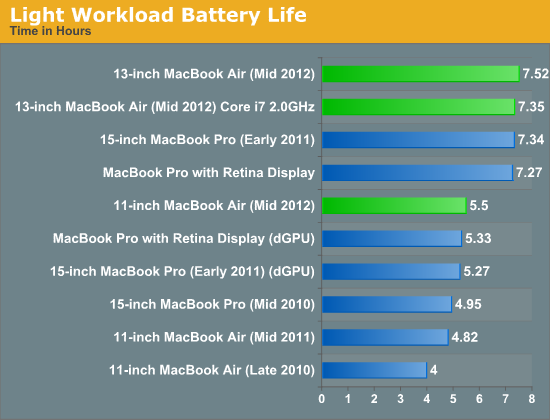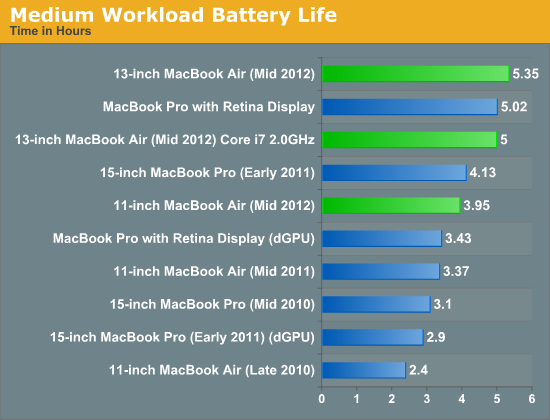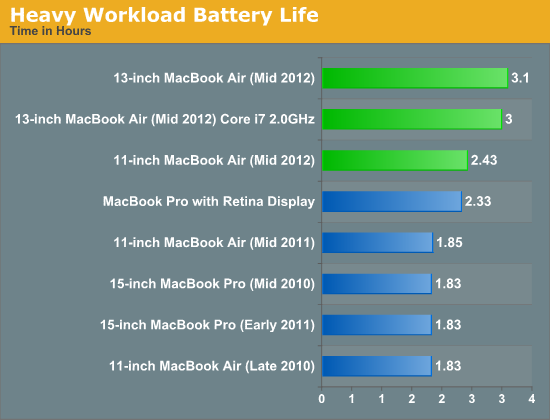The 2012 MacBook Air (11 & 13-inch) Review
by Anand Lal Shimpi on July 16, 2012 12:53 PM EST- Posted in
- Apple
- Mac
- MacBook Air
- Laptops
- Notebooks
Battery Life
The MacBook Air sees no increase in battery capacity over the previous generation, as a result any improvement in battery life boils down to what we get from Ivy Bridge. I'm stuck rebuilding the battery life results database from scratch now that I've built a new suite of tests for OS X. I've run all three generations of 11-inch MacBook Air through the new suite but I don't have numbers for the older 13-inch MBAs unfortunately. As I mentioned in the rMBP review, the new suite is designed to give accurate data points at three usage models: one light, one medium and one heavy. The combination of all three should give you an idea of the behavior of these systems on battery.
Across the board battery life of the 13-inch MacBook Air is actually quite similar to the Retina MacBook Pro, just from a much smaller battery and without the variability introduced by the rMBP's discrete GPU. If anything the lack of a discrete GPU makes using the MacBook Air much simpler from a battery life perspective. As much as I love Cody Krieger's gfxCardStatus application, it's nice not having to keep an eye on it to see if something silly has triggered the dGPU.

Under light usage the new 13-inch MacBook Air is easily able to meet Apple's claim of 7 hours of battery life. The 11-inch model does the same to its 5 hours rating, beating it by the same 30 minute margin as the 13.

The medium workload thins the herd a bit, with the 13-inch Air still coming out on top but at 5.35 hours. The 11-inch Air drops below 4 hours, which is an improvement over the previous two generations of 11-inch Airs. Once again we see an example of Ivy Bridge doing better than Sandy Bridge when it comes to mobile power usage.

Under heavy load is really where we see Intel's 22nm process deliver the gold. Here both of the 2012 MacBook Air models do very well. With the 13-inch MBA significantly outpacing even the rMBP with its 95Wh battery, while doing the exact same amount of work.
The 13-inch MacBook Air continues to be Apple's best notebook for those who care about battery life. The 11 offers portability but you do take a significant hit in battery life.










190 Comments
View All Comments
C1aymore - Monday, July 16, 2012 - link
Nothing, just want to be the firstkrylon - Monday, July 16, 2012 - link
how about I go first all over your face?Spunjji - Tuesday, July 17, 2012 - link
Bahahassddaydream - Monday, July 16, 2012 - link
I really hate it when people do that^I am wondering what percentage of "power users" will start trending towards machines like the MacBook Air and Pro. It seems that the cost differences are eroding away between the likes of computers like Clevo-based Malibal and Apple products.
It seems to me that the Apple products are priced pretty competitively, and offer more flexibility by being able run OSX as well as Windows or Linux.
I doubt I'll purchase an Apple computer, but it seems more compelling than ever, especially with the display on the MacBook Pro.
ananduser - Monday, July 16, 2012 - link
Yes...Apple is to be commended for allowing choice in the OS department, unlike other OEMs.Only the boss is qualified to review them apples, eh Anand :)
Samus - Monday, July 16, 2012 - link
what? choice in os? every 'OEM' that's tried to make a Mac OSX compatible computer has been sued out of business by Apple.I don't see how Apple giving you choice because they don't allow their competitors to have any is something to be commended!
OCedHrt - Monday, July 16, 2012 - link
And compatibility issues (USD 3.0, WIFI) is the peripheral's manufacturer's fault on OS X. But on Windows damn that Microsoft!!!KPOM - Tuesday, July 17, 2012 - link
Where has Anand ever blamed Microsoft because some random peripheral doesn't work right? In general, it's up to the peripheral manufacturer to write decent drivers. Because of OS X's small market share, a lot of manufacturers don't bother, or at least don't do as good a job of writing OS X drivers as they do Windows drivers.ananduser - Tuesday, July 17, 2012 - link
Apple is the one in control of OSX' drivers. The manufacturers of various interfaces have no say.KPOM - Tuesday, July 17, 2012 - link
No, individual peripheral manufacturers write their own OS X drivers. Apple has standards, but even Microsoft requires digital signing.Apple isn't in the business of writing drivers for every peripheral out there. They provide APIs to let peripheral manufacturer write their own drivers.